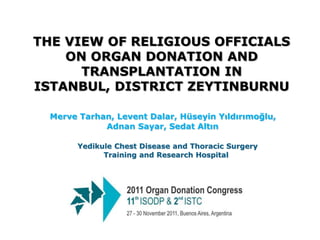Merve Tarhan - Turkey - Wednesday 30 - Oral Presentations Misc. A
- 1. THE VIEW OF RELIGIOUS OFFICIALS ON ORGAN DONATION AND TRANSPLANTATION IN ISTANBUL, DISTRICT ZEYTINBURNU Merve Tarhan, Levent Dalar, Hüseyin Yıldırımoğlu, Adnan Sayar, Sedat Altın Yedikule Chest Disease and Thoracic Surgery Training and Research Hospital
- 2. INTRODUCTION & OBJECTIVE Organ donation, because it is a social issue, requires the attention of those working in the fields of social, legal and press/publication and especially the religious officials. One of the obstacles before organ donation and transplantation in our country is religious beliefs and at this point the key role rests with religious officials. Positive or negative opinion of religious officials on organ donation and transplantation are effective in guiding the community. This study was made to be descriptive for the purpose of appraising the viewpoints on this subject of religious officials, who can take on an important role in this subject
- 3. MATERIAL & METHODS The data from the survey were collected via a survey form from 40 religious officials working for Zeytinburnu District Muftu's Office and who have participated the monthly ordinary meeting in April and filled out the form. The survey form consisted of 27 open and closed ended questions 5 of which were on socio-demographic characteristics, 13 on viewpoints on organ donation and transplantation and 9 on the Islamic viewpoint on organ donation and transplantation. After the verbal approval of the religious officials was obtained and explanations on the survey were made the survey forms were distributed. The statistical analyses of the data obtained were evaluated with the student-t test and Oneway Anova test using the “SPSS 16.0 for Windows” package program.
- 4. RESULTS Their State of Knowledge on Organ Donation and Sources From Where Information is Obtained Seminars/Conference Television/Radio Directorate of Religious Affairs Publications Newpaper/Magazine Religious Publications Internet Verse/Hadith Lessons I don't receive Poster/Brochure Friends Hospital 0 10 20 30 40 50 60
- 5. RESULTS Places to Apply for Organ Donation All 7,5 Health Care Organizations 45 Organ Transplantation Coordination 45 Medical Board 27,5 Security Directorate 12,5 I don't know 40
- 6. • Their knowledge on Organ Opinion on Making Organ Donation and Transplantation Donation Adequate %22,5 Partially adequate %52,5 5% Inadequate %25 Yes, I donated 15% • Knowledge opened religious officials in our country regarding I am considering but I did organ donation and transplantation not donate No, I am not considering Adequate %10 80% Partially adequate %35 Inadequate %55
- 7. Reasons for Religious Officials for Not Donating Organs % There is no specific reason 35 I never thought on this subject. 27,5 I believe organs donated will be used in on unsuitable way 25 I am afraid , I don’t feel ready. 22,5 My health conditions are not suitable 22,5 I don’t have enough information on organ donation. 22,5 I don’t trust doctors 17,5 Even if there is brain death I don’t want my organs to be taken 7,5 when my heart is working My religious beliefs prevent mentioned from donating my organs 7,5 I don’t know where to apply to 5 I am affected by the press 5 I heard that there were those who returned to life after brain 2,5 death Trust for health care people is little, it can be used for other 2,5 purposes I don’t want my body integrity destroyed 2,5 I am against organ donation 0
- 8. RESULTS • İntegrity which is important in survival after View of Islam Religion on death Body İntegrity %0 Organ Donation and Spiritual İntegrity %77,5 Transplantation Body and Spiritual İntegrity %22,5 • Suitability to our religion of have organ transplanted from a non-muslim person 0% Yes %70 8% Positive No %2,5 I don’t know %27,5 Negative • Case of a difference between points of view in our country and in other muslim countries Yes %55 I don't No %10 92% know I don’t know %35 • Case of receiving questions from the public regarding organ donation and transplantation Yes %70 No %30
- 9. Proposals of Religious Officials to Increase Interest in Organ % Donation Religious officials should lead 85 Education should be given in schools 70 Media should show interest 70 Health care personnel should lead 67,5 The society should be educated 65 All 40 Trust should be provided 5 Psychologists, religious officials and doctors should cooperate 2,5
- 10. RESULTS Duties Falling on Religious Officials to Increase Interest in Organ Donation % Religious officials making speeches on organ donation in conservations, 65 meetings and sermons Cooperative of professionals groups such as health care, religion and law in 57,5 order to inform the public Education related to organ donation should be given in schools which 52,5 provide religious education Supporting the subject religiously with verses and hadiths 47,5 Donating organs to set an example 37,5 Others 5
- 11. °ä°ż±·°äł˘±«ł§Ä°°ż±· In conclusion, when the medical, legal and religious aspect of organ donation and transplantation in Turkey is considered a great task falls on the health care personnel, lawyers and religious officials and at the same time these three professionals groups should work in an integrated manner. The religious concerns of the public on organ donation and transplantation can only be accommodated by the religious organizations and religious officials to take part in these campaigns. In order for them to set an example for the public they need firstly to make a donation and in order to provide education for the public they need to be knowledgeable and educated in this subject through in-house training. In order for all these to be performed in a more regular manner, health care personnel need to go to the mosques and muftu's offices more frequently. The only way in achieving the desired goal in transplantation is to increase the number of donations.











